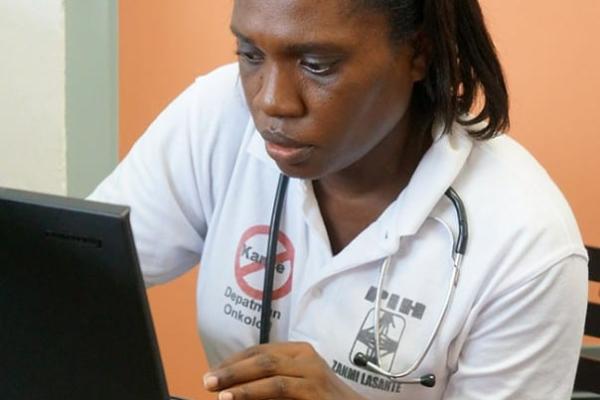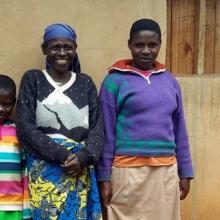Meet Dr. Ruth Damuse
Dr. Ruth Damuse, oncology program director for Partners In Health’s Haitian sister organization, Zanmi Lasante, helped establish PIH/ZL’s formal cancer care in Haiti. Zanmi Lasante’s oncology program started at its hospital in Cange in the Central Plateau and now serves patients at University Hospital in Mirebalais. The hospital sees an average of 22 oncology patients each day, and patients receive care free of charge. To mark World Cancer Day, Feb. 4, we asked Damuse a few questions about PIH/ZL’s cancer care.
Before Zanmi Lasante started offering oncology services, what was likely to happen to a person with cancer in rural Haiti?
Before ZL officially offered oncology services in our network, people in rural Haiti didn’t have any chance to have access to cancer care. A few patients would try to get the services in the capital, Port-au-Prince, but the cost would be so high, they would start a treatment and stop in the middle of the process.
Why is it important for patients at University Hospital to have access to oncology services?
Because it was our promise to the community. University Hospital was built to become the center of excellence for quality care in Haiti and to be the place where the next generation of Haitian health professionals would be trained.
How has cancer care evolved at University Hospital?
Since the oncology services moved from Cange to Mirebalais, the number of cases has more than doubled and continues to grow every day. Our diagnostic capacity continues to expand, and we routinely perform biopsies (mostly core needle biopsies) as well as CT scans in order to diagnose and stage patients. In November 2014, an oncology rotation was added to the internal medicine residency program for second-year residents. So far, two second-year internal medicine residents have completed a four-week rotation in the oncology service.
The first patient who had surgery at University Hospital was a breast cancer patient. We are working to integrate oncology care with surgery, and we even have a surgical oncology clinic each week. Oncology cases make up a significant portion of the surgeries performed at University Hospital. Our diagnostic and staging capability has significantly increased since moving to University Hospital, and we can use the CT scanner for staging as well as for procedures such as CT-guided biopsies, something not available anywhere else in the public sector [in Haiti].
Through our integration with internal medicine and our collaboration with other teams throughout the hospital (surgery and mental health, etc.), we are able to offer comprehensive services to patients with a variety of cancer diagnoses.
How has PIH’s partnership with Brigham and Women’s Hospital and the Dana-Farber Cancer Institute helped improve cancer care?
The partnership with the BWH and DFCI is the key to our success. I like to tell our patients that even though they can only see our local team, there is an even bigger team of experts working on their cases. The BWH/DFCI provides ongoing support to our program. The pathology lab of the BWH processes all our samples with no cost, which is vital for the diagnosis and treatment of patients. This level of pathology services is not available anywhere in Haiti.
We hold weekly calls with DFCI-affiliated oncologists to discuss patient care. Each week we review individual patient cases to determine care plans and monitor progress.
DFCI also allowed us to extend our psychosocial team by supporting the salary of an assistant social worker. They continue to support us financially, providing essential tools and programmatic support. They also facilitated the process to have another internist working in the program.
What makes this program unusual?
We are the only center in the country to provide free cancer care and also the only hospital to offer comprehensive cancer care, including palliative care and psycho-social support. We provide the highest quality of cancer care anywhere in the country, and we do so for free.

